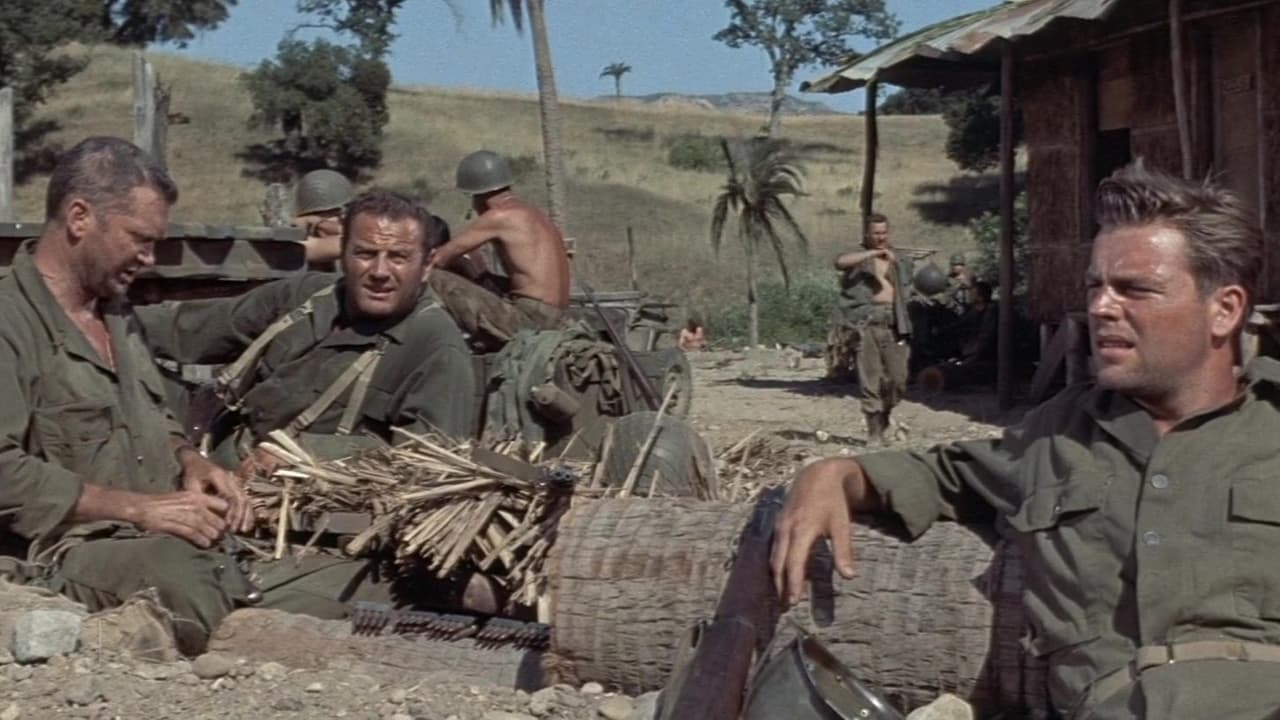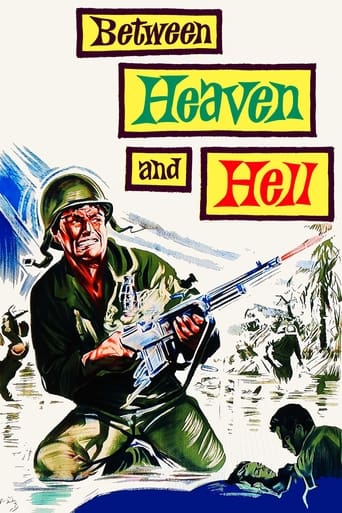

It all comes down to the fact that it had to take the advent of World War 11 to change the thinking of wealthy landowner and share cropper Robert Wagner. He mistreats those who work under him, while marrying the daughter of another wealthy owner, David Keith, who had the foresight to see that war was coming and that the south would change again by war's end.Stationed in the Pacific, Wagner endures the hardship of war and sees incompetent as well as brutal leadership. His newly found friends are killed before his eyes, and is emotional shaking results.Buddy Ebsen co-stars as a fellow soldier and friend to Wagner. Broderick Crawford is memorable as the fast, tough talking unit leader, Waco, who can be brutal to the core, while remembering an army of strong discipline.
... View More"Violent Saturday" director Richard Fleischer's explosive, bullet-riddled epic "Between Heaven & Hell" combines the plot about clashes between subordinates and their superior officers set against the backdrop of World War II combat in the Pacific with the problem melodrama about Old and New South social consciousness. Robert Wagner starts out as an elitist, bourbon & branch water swilling, Southern cotton gin operator who displays no sympathy for his poor sharecroppers. Before this sturdy 94-minute, Cinemascope movie fades out, the protagonist turns over a new leaf and becomes a more considerate individual who is concerned about the welfare of his workers. The clash between officers in Fleischer's film reached the screen a mere six days before director Robert Aldritch's cynical wartime thriller "Attack." "Between Heaven and Hell" came out October 11, 1956, while "Attack" debuted October 17, 1956. Nevertheless, "Attack" ranks as a more compelling outing because Robert Wagner's NCO doesn't kill the pusillanimous officer, while Lt. Harold 'Harry' Woodruff (William Smithers) in "Attack" kills a cowardly officer. Interestingly enough, Buddy Ebsen appeared in both movies as a G.I. Unlike "Attack," "Between Heaven and Hell" confronts the issue of inequity between poor whites and affluent whites in the Old South. Actually, "Attack" surpasses "Between Heaven and Hell," but the latter picture adds weight to the trend in American World War II movies about clashes between commanders and subordinates. Like the Aldritch film, "Between Heaven and Hell" painted an unsavory portrait of life in the military that showed American soldiers with feet of clay that films such as "The Naked and the Dead," "Tarawa Beachhead" and "The Victors" would build on in later years.The Fleischer film opens with two soldiers escorting Private Sam Francis Gifford (Robert Wagner of "Titanic") to see Lieutenant Colonel Miles (Frank Gerstle of "D.O.A") about a disciplinary problem after Sam has been arrested for attempting to kill a superior officer. Matters are complicated somewhat because Sam has received a Silver Star for dangling himself off the side of a cliff to sling explosives into a Japanese machine gun emplacement in a cave, a setting that suggests that this exploit occurred on Guadalcanal. Since Sam has won the medal, Miles prefers to send him to serve with George Company rather than imprison him in Leavenworth. The grim dialogue between Sam and the driver of the jeep, Private Willie Crawford (Buddy Ebsen of "Parachute Battalion") suggests that prison would be preferable. Crawford observes as he hands his M-1 rifle to Sam. "Go ahead and kill someone, I don't care. How did you get in this outfit?" Sam replies without enthusiasm, "It was that or Leavenworth." Crawford shrugs, "Shoulda taken Leavenworth." Sam meets his new superior officer, off-his-rocker Captain 'Waco' Grimes, Commanding Officer, who stipulates that nobody can call him by his rank. Waco dreads that a Japanese sniper will kill him, so he insists that nobody refer to him by his rank. Waco keeps two Thompson machine-gun wielding soldiers at his sides at all times, Private. Swanson (Skip Homeier of "The Gunfighter") and Private Millard (Frank Gorshin of "Batman"), and they wear only t-shirts on this upper chests rather than proper combat fatigues. Waco makes Sam his radio operator and Sam stretches out on the ground after Waco dismisses him and stares into a mud hole. The surface of the mud hole ripples when Sam tosses a pebble in it and the film shifts into flashback mode some 15 minutes into the action to take us back before Pearl Harbor to the South when Sam was a heartless but well-heeled cotton gin operator who had married Jenny (Terry Moore of "Mighty Joe Young") and they were living high off the hog. We learn Jenny's father, Colonel Cousins (Robert Keith of "Branded"),commands Sam's National Guard outfit and organizes it to mobilize for duty. Before his call to duty after Pearl Harbor, Sam reprimands the laziness of his sharecroppers and treats them like dirt. Our hero buddies up with several G.I.s and they become fast friends until they die. Foremost among them is a country boy named Private Crawford. It seems that Sam and his friends were checking out a village when an officer got a case of the nerves and shot Sam's three friends. Sam clobbers the lieutenant with his rifle butt and winds up behind the wire."Between Heaven and Hell" suffers minimally from the usual idiocy that afflicts many Hollywood World War II movies. Specifically, American officers wear their rank on the front of their helmets—rather than the rear--making him easy for vigilant Japanese snipers. Unlike most World War II movies, an officer here who dons his helmet with his rank prominently on show dies from a sharpshooting enemy marksman. Top-notch photography by "The Day the Earth Stood Still" lenser Leo Tover gives "Between Heaven and Hell" a sprawling, virile appearance, that belies its actual location at the Twentieth Century-Fox ranch in the Santa Monica Mountains, while "Dead Reckoning" composer Hugo Friedhofer received an Academy Award nomination for his orchestral score. Fleischer conjures up commendable suspense and excitement primarily with the standard theme of friendship; soldiers who buddy up suddenly have to confront the loss of their new-found friends. Meanwhile, this above-average combat opus boasts a cast of first-class thespians that includes Broderick Crawford, Buddy Ebsen, Brad Dexter, Ken Clark, Frank Gorshin, Skip Homeier, and Harvey Lembeck. Fleischer and "D-Day, The Sixth of June" & "A Walk in the Sun" scenarist Harry Brown, who adapted Arkansas-born novelist Francis Gwaltney's 1955 fiction book "The Day the Century Ended," give their military fans more than enough firefights to past muster. Interestingly, Rod Serling tried without success to adapt the Gwaltney novel. Moreover, Gwaltney was a Pacific campaign veteran. American Film Institute records state that,John Sturges was scheduled to helm it. Guy Madison was up for the Robert Wagner role and Twentieth Century Fox contract actress Joan Collins was considered for the role that Terry Moore inherited.
... View MoreThe location of what's directly Between Heaven and Hell is the Pacific Theater during World War II. Robert Wagner, recently a sergeant, but busted down for striking an officer, gets himself transferred to a new outfit. He's now in a company in a forward position on a remote Pacific Island where the outcome is still in doubt. There's one crazy captain in charge played by Broderick Crawford. He's a bit combat happy to say the least.Wagner was a spoiled rich kid who married the boss's daughter, Terry Moore, and he's pretty hard on the sharecroppers he manages. That all changes for Wagner during his service in the Pacific where his national guard outfit is now serving and he's with a lot of these same people and his life depends on them and they, him. He gets to reevaluate a whole lot of what he had believed before.Between Heaven and Hell is a no compromising look at the Pacific War and the men who fought it. Wagner does well in the lead role, but acting honors go to Broderick Crawford as the captain who's bucking for a section 8. When he does get relieved, note the interesting suicide by sniper scenario he sets up for himself. Also Buddy Ebsen plays a very similar role to the one he played in Attack which also came out in the same year. Ebsen plays one of the sharecroppers who Wagner previously looked down on. Ebsen was staging something of a comeback himself, he would soon be cast in Walt Disney's Davy Crockett and then in The Beverly Hillbillies. Some of those comic parts make us forget what a fine dramatic actor Ebsen could be. He just wasn't given the chance often enough.For those who like their war pictures with a minimum of flag waving, Between Heaven and Hell is definitely for you.
... View MoreI have a large collection of war movies and consider this one to be among the best ever made. Many of the war movies have what I consider to be too many flashback scenes of home and try to become love stories with a few battle scenes. These scenes in Between Heaven and Hell actually have a real purpose in the story. More than any war movie that I have seen, this one shows a trend in American history that is often overlookthe fact that wars and the men who serve in them traditionally return home with a more egalitarian outlook, hungry to reform the society that they left. Between Heaven and Hell shows a man's transformation into a better person as a result of his war experiences. Sam Gifford is a man on the edge of breaking from the strain of war. He has experienced loss and hardship and realized that in the past he has been the unnecessary source of it for others. Between Heaven and Hell has a psychological realism that most war movies lack. It shows war heroes for what they aremen who rise above their ordinary selves to do extraordinary things in adversity. This is great story telling with great characters.
... View More